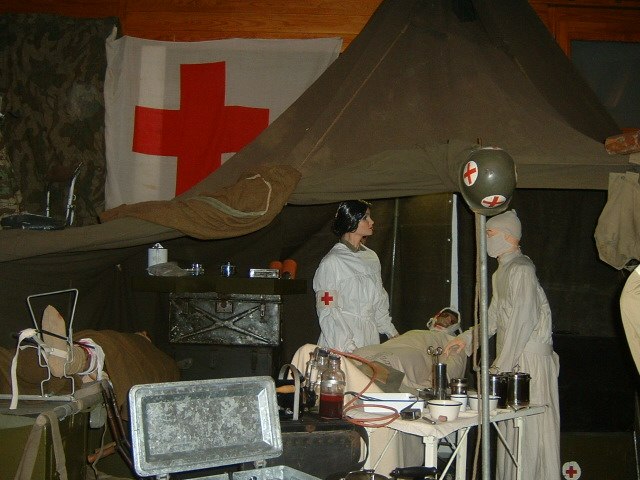Sri Lanka Army Medical Corps
The Sri Lanka Army Medical Corps (SLAMC) (Sinhala: ශ්රී ලංකා යුද හමුදා වෛද්ය බලකාය Shri Lanka Yuddha Hamuda Vayidya Balakaya) is a specialist corps in the Sri Lanka Army which specializes in military medicine and provides medical services to all army personnel and their families in war and in peace. It is made up of 4 regular units and one volunteer unit. Headquartered in Colombo, formally at army headquarters. The corps Cap badge depicting the Rod of Asclepius. General officers and senior officers of the SLMC wear gorget patches of maroon rather than of scarlet worn by other officers of similar rank.
Ceylon Medical Corps war grave, Newington Cemetery, Edinburgh
The term military medicine has a number of potential connotations. It may mean:A medical specialty, specifically a branch of occupational medicine attending to the medical risks and needs of soldiers, sailors and other service members. This disparate arena has historically involved the prevention and treatment of infectious diseases, and, in the 20th century, the ergonomics and health effects of operating military-specific machines and equipment such as submarines, tanks, helicopters and airplanes. Undersea and aviation medicine can be understood as subspecialties of military medicine, or in any case originated as such. Few countries certify or recognize "military medicine" as a formal speciality or subspeciality in its own right.
The planning and practice of the surgical management of mass battlefield casualties and the logistical and administrative considerations of establishing and operating combat support hospitals. This involves military medical hierarchies, especially the organization of structured medical command and administrative systems that interact with and support deployed combat units.
The administration and practice of health care for military service members and their dependents in non-deployed (peacetime) settings. This may consist of a medical system paralleling all the medical specialties and sub-specialties that exist in the civilian sector.
Medical research and development specifically bearing upon problems of military medical interest. Historically, this encompasses all of the medical advances emerging from medical research efforts directed at addressing the problems encountered by deployed military forces many of which ultimately prove important beyond the purely military considerations that inspired them.

French surgeon Ambroise Paré (c. 1510–1590) — known as the "Father of Military Medicine" — attending to a soldier's amputated leg.
Two French military surgeons treating wounded enemies after the battle of Inkermann, November 5, 1854.
WWII era field hospital re-created operating tent using puppets, Diekirch Military Museum, Luxembourg
A U.S. Combat Support Hospital (CSH), a type of mobile field hospital, used in war or disasters; successor to the Mobile Army Surgical Hospital (MASH)





